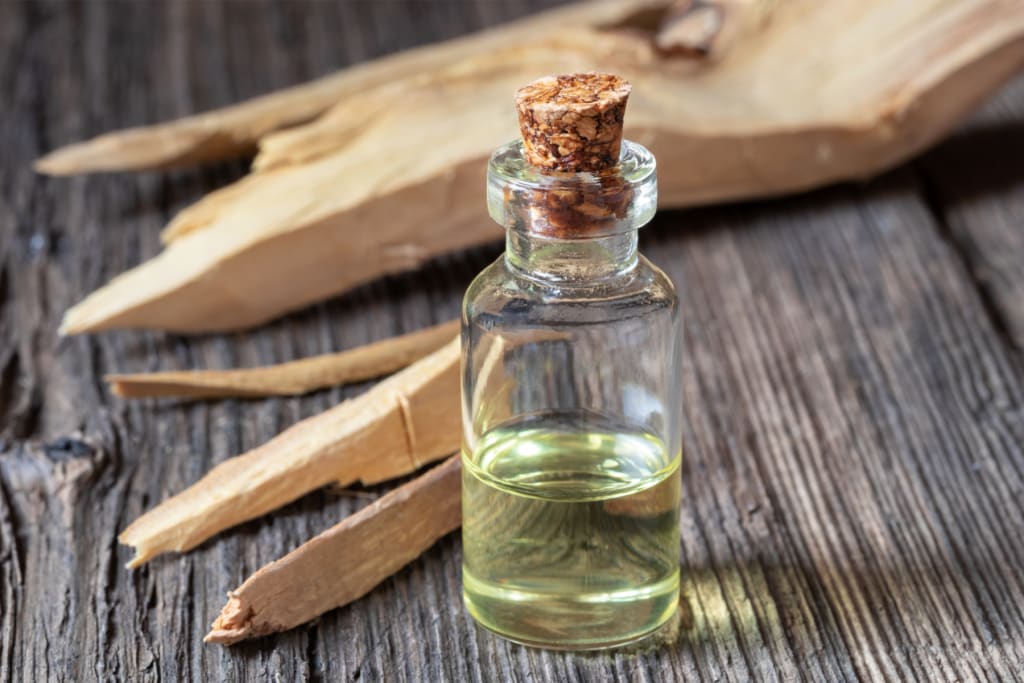
Sandalwood Oil: Health Benefits and Uses
What is Sandalwood?
Sandalwood is an evergreen tree native to India and Indonesia that reaches a height of 8 to 12 meters and a diameter of 2.5 meters. The little blooms have numerous short stalks, and the bark is smooth and gray-brown in hue.
Scientific Name:
Album by Santalum
Common Name of the Plant (s):
Santal oil, white Saunders oil, white or yellow sandalwood oil, and East Indian sandalwood oil are all names for sandalwood.
What is it Used for?
Uses in Traditional/Ethnobotanical Medicine
Sandalwood oil has a warm, woody scent and is often used in incense, cosmetics, perfumes, and soaps as a fragrance. It's also utilized as a flavoring in meals and drinks. Because of its solid nature, the wood has long been prized for carving.
Sandalwood oil has long been used in traditional medicine as an antibacterial and astringent, as well as for the treatment of headaches, stomachaches, and urinary and vaginal issues. Sandalwood essential oil, emulsion, or paste is used to treat inflammatory and eruptive skin problems in India. The oil has been used as a diuretic and moderate stimulant in traditional Ayurvedic medicine, as well as for skin smoothing. The leaves and bark were used to treat dandruff, lice, skin inflammation, and sexually transmitted infections by the early Hawaiians. Sandalwood oil has also been shown to resist Tetranychus urtica, an agricultural pest (two-spotted spider mite).
Uses in general
Sandalwood oil has been said to have diuretic and antibacterial effects, although there are no clinical trials to back this up. The oil's primary use has been as a scent enhancer.
What is the suggested dose?
A dose of 1 to 1.5 g daily for no more than 6 weeks is indicated for the treatment of urological disorders. Sandalwood oil should be dosed in a coat that is resistant to gastrointestinal fluids. Ingestion of the oil in its natural state is not recommended.
The correct dosage of white sandalwood is determined by a number of factors, including the user's age, health, and other circumstances. There is currently insufficient scientific evidence to define an optimal dosing range for white sandalwood. Keep in mind that natural products aren't always safe, and that dosages are crucial. Before using, be sure to read the product label and consult your pharmacist, physician, or other healthcare expert.
Benefits of Sandalwood Oil

Antiseptic:
Sandalwood oil is a safe and powerful antibacterial that may be used both physically and internally. Sandalwood oil can be used to treat acne, ulcers, boils, and pimples that have progressed to infection or have become septic.
Anti-inflammatory:
Anti-inflammatory properties of sandalwood oil and paste are excellent. Sandalwood oil appears to have a relaxing cool impact and gives immediate relief from inflammation in the brain, gastrointestinal, neurological, circulatory, and excretory systems caused by fever, antibiotic overuse, insect bites, or wounds, according to research.
Natural sedative:
Sandalwood oil has a lot of potential as a natural sedative and relaxant for spasms. Sandalwood oil has been shown in studies to calm nerves and muscles, resulting in the relief of spasms and contractions. It is also beneficial in the treatment of cramps, colds, and pains. Sandalwood oil relaxes the muscles of the intestine and abdomen, aiding gas clearance and preventing the formation of excess gases.
Blood Pressure is Reduced:
Sandalwood oil has a hypotensive ingredient that helps to decrease blood pressure. To control blood pressure, use edible sandalwood oil with milk or another drink. Even when used externally, it works well to reduce hypertension.
Reduced Stress:
Sandalwood oil is known for its calming properties. The oil's warm and soothing woody aroma helps you relax and calm down. This is one of the best essential oils for controlling your emotions and promoting peace and harmony. To relieve stress and anxiety, use sandalwood oil on your wrists and ankles or breath it straight.
Enhances Dental Health:

Sandalwood oil's astringent characteristics are highly helpful in preventing the formation of cavity-causing germs in the mouth. It not only aids in the treatment of bleeding gums and the healing of minor wounds, but it also aids in the cleansing of the mouth, the enhancement of salivation by improving gastrointestinal tract secretions, and the strengthening of the gums.
Heals Injuries:
Sandalwood oil has potent antibacterial, antiviral, and antifungal characteristics, making it useful not only for eradicating bacteria and germs from the body, but also for treating wounds and enhancing the healing process. The bioactive components in this remarkable bark have been utilized to heal numerous skin ailments such as wounds, ulcers, and skin fungus since ancient times.
Enhances one's appearance:
This essential oil derived from sandalwood bark is widely used to promote skin health due to its antioxidant properties. It effectively scavenges free radicals and reduces oxidative damage on the skin. It also removes toxins from the skin's innermost layers, enhances general skin health, and heals a variety of skin illnesses such as acne, pimples, rashes, and boils.
Consequences
When consumed by mouth in meal proportions, white sandalwood is LIKELY SAFE. When used by mouth as a medicine for more than 6 weeks, however, it is POSSIBLY UNSAFE. Long-term use has been linked to renal impairment in certain people.
White sandalwood can induce itching, nausea, stomach distress, and blood in the urine when taken by mouth.
The safety of putting white sandalwood to the skin in doses greater than those found in cosmetics is unknown. Some people may experience allergic skin reactions after coming into contact with white sandalwood.
Warnings & Special Precautions:
Breast-feeding and pregnancy: If you're pregnant, taking white sandalwood by mouth in amounts more than food is almost certainly unsafe. There have been miscarriages reported.
When it comes to the safety of consuming white sandalwood during breastfeeding, there isn't enough credible information. To be on the safe side, avoid using it.
Kidney Disease: If you have kidney problems, you should avoid using white sandalwood. It has the potential to aggravate kidney disease.
About the Creator
Prakuzo
I Write Health and Fitness, Personal Growth and Spirituality






Comments
There are no comments for this story
Be the first to respond and start the conversation.